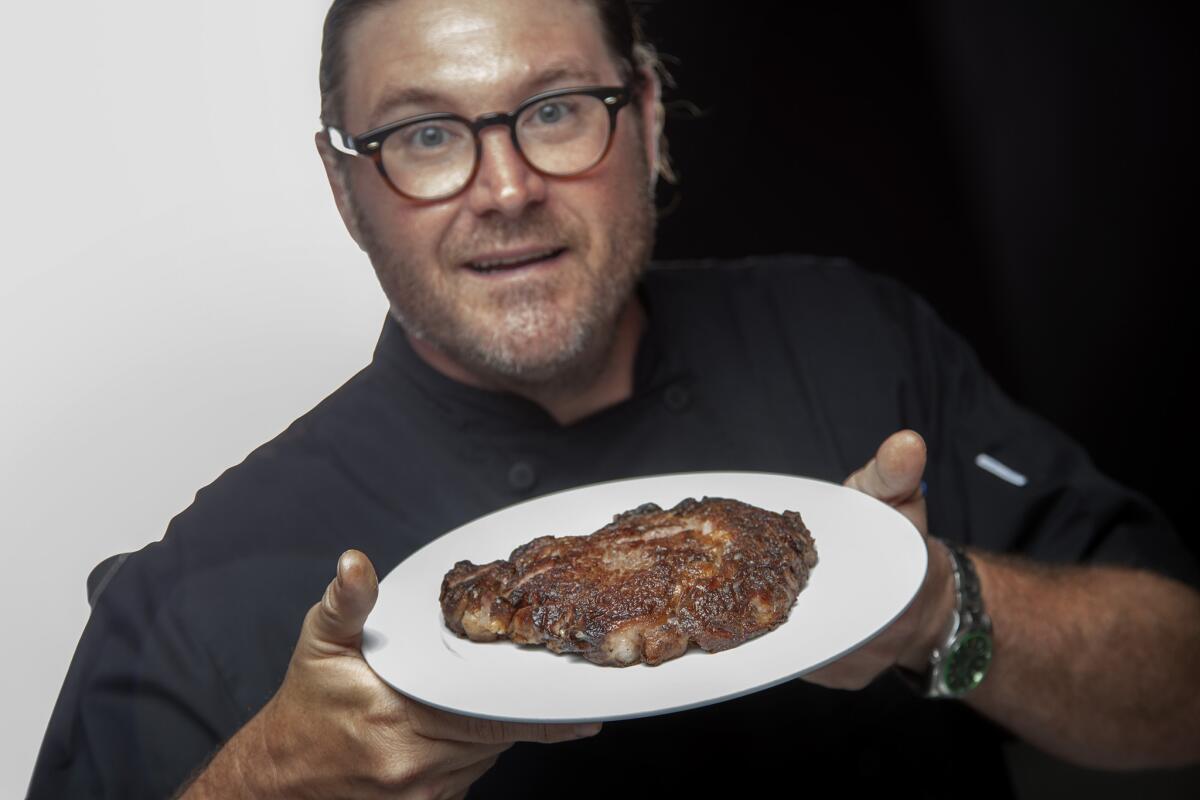August’s favorite recipe? Steak on the stove

Chef David Lefevre with his rib-eye steak at the Times’ Test Kitchen on July 28.
- Share via
August was definitely grilling weather in Southern California. So it’s probably no surprise that the overwhelming favorite recipe last month was steak -- even if it was cooked on the stove.
David LeFevre’s rib-eye steak was the No. 1 most downloaded recipe from our California Cookbook database in August. That’s some accomplishment because the recipe consisted of just four ingredients -- steak, salt, pepper and cooking oil.
The popular Manhattan Beach chef also had the eighth-most-popular recipe, the cute little Key lime pies from his Fishing With Dynamite.
Following LeFevre’s steak was another chef recipe -- Jessica Koslow’s rice bowl with cauliflower, zucchini and eggplant from her Sqirl restaurant in East Hollywood.
The third-most-popular recipe was the summer salad with Israeli couscous that had also been among July’s top 10.
No. 4 was the vintage strawberry pie pastry chef Roxana Jullapat made when she visited the test kitchen for a video.
Rounding out the top 5 was a recipe for braised chicken with capers that can be completed in less than an hour.
DAVID LEFEVRE’S RIB-EYE STEAK
1 (16-ounce) boneless prime rib-eye steak, at least 1½ inches thick
Fleur de sel
Black pepper
Canola oil, or similar high-heat oil, for cooking
1. Temper the steak: Remove the steak from the refrigerator and set aside to come to room temperature, 15 minutes or as needed. Blot the steak on all sides with paper towels to remove excess moisture. Season the steak on each side and along the edge with 1 to 2 teaspoons fleur de sel, or as desired. Liberally grind black pepper all over the steak.
2. Heat a cast-iron skillet over high heat until hot. Add 2 to 3 tablespoons oil to the pan, then quickly add the steak. Tilt the pan away from you, placing the steak in the pan away from the oil so it does not splatter. Do not move the steak in the pan, but rotate the pan to move the oil along the base of the pan, giving the steak time to develop a rich golden crust, about 3 minutes. Shortly before flipping the steak over, gently baste the top of the steak with spoonfuls of hot oil.
3. Carefully flip the steak in the pan. Continue to sauté on the other side, rotating the pan to move the oil while leaving the steak undisturbed as it forms a rich crust on the bottom, about 3 more minutes.
4. Check the steak for doneness. LeFevre prefers to cook the steak until the meat just begins to glisten as juices rise to the surface and the meat slowly springs back when gently pressed; a thermometer inserted into the thickest part of the steak should reach about 118 degrees (the temperature will continue to rise as it rests). Remove the steak to a cooling rack for 6 to 8 minutes to give the meat time to rest and recollect the juices before serving and slicing.
Each of 2 servings (using 1 teaspoon salt):
Calories 669; Protein 43 grams; Carbohydrates 0; Fiber 0; Fat 54 grams; Saturated fat 17 grams; Cholesterol 145 mg; Sugar 0; Sodium 1,216 mg.
Are you a food geek? Follow me on Twitter @russ_parsons1
ALSO:
Your next restaurant has a movie trailer
10 school lunches your kid will actually eat
More to Read
Eat your way across L.A.
Get our weekly Tasting Notes newsletter for reviews, news and more.
You may occasionally receive promotional content from the Los Angeles Times.











